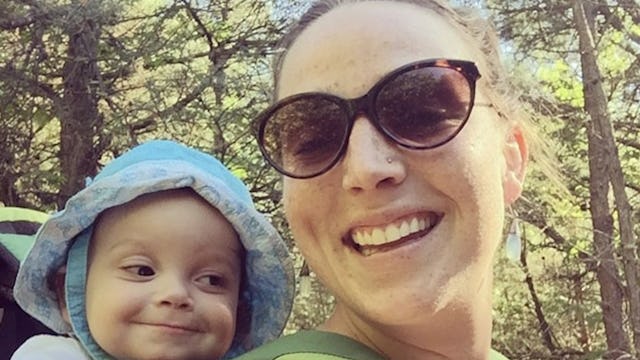Obituary Goes Viral For Its Heartbreaking Honesty About Opioid Addiction

The obituary of a young mom who died due to an opioid addiction is spreading awareness about the epidemic and empathy for those with the disease
Millions of Americans are suffering from opioid addiction, and five times more people overdosed on these drugs in 2016 than in 1999. But of all of those we have lost to opioids in recent years, the obituary of one young woman from Vermont named Madelyn Ellen Linsenmeir has gone viral in the last day, sharing the story of just one person, but shedding light on the disease of addiction, the opioid crisis, and the problematic way that society looks at addicts.
Written by the 30-year-old’s family, the obituary is starkly honest and open — unlike so many obituaries that skirt the sad truths behind the premature deaths of addicts. It describes Linsenmeir’s promising young life, her struggle to stay sober, and finally, her family losing her to addiction.
“Our beloved Madelyn Ellen Linsenmeir died on Sunday, October 7,” the obituary beings. “While her death was unexpected, Madelyn suffered from drug addiction, and for years we feared her addiction would claim her life. We are grateful that when she died, she was safe and she was with her family.”
They go on to describe her love of singing and performance, as well as her first brush with OxyContin, an experience that would change her life.
“When she was 16, she moved with her parents from Vermont to Florida to attend a performing arts high school,” it reads. “Soon after she tried OxyContin for the first time at a high school party, and so began a relationship with opiates that would dominate the rest of her life.”
The family continues to describe her struggle to stay away from drugs, which included the birth of her son, Ayden.
“After having Ayden, Maddie tried harder and more relentlessly to stay sober than we have ever seen anyone try at anything. But she relapsed and ultimately lost custody of her son, a loss that was unbearable.”
It also included a memory of a short time span this summer when she was at home with her parents and Ayden, mostly sober, enjoying life before addiction took her again.
“For 12 days this summer, she was home, and for most of that time she was sober. For those 12 wonderful days, full of swimming and Disney movies and family dinners, we believed as we always did that she would overcome her disease and make the life for herself we knew she deserved. We believed this until the moment she took her last breath. But her addiction stalked her and stole her once again.”
According to the National Institute on Drug Abuse (NIDA), an estimated 114 people in America die every single day from an opioid overdose, including using drugs like heroin, prescription pain relievers, and synthetic opioids like fentanyl. This number continues to grow, as doctors overprescribe prescription painkillers and as they become easier to get on the street.
Because eighty percent of people who abuse opioids begin by taking prescribed medicine, opioid addictions cross socio-economic lines and are blind to age, race, sex and location. They are also one of the most addictive drugs, and their escalating use can upturn every aspect of a person’s life — addicts often lose their jobs, their homes, their financial stability, and their families.
The most gripping parts of the obituary are when it explores the real roots of addiction, and what it’s like to lose a family member to this dark end.
“During the past two years especially, her disease brought her to places of incredible darkness, and this darkness compounded on itself, as each unspeakable thing that happened to her and each horrible thing she did in the name of her disease exponentially increased her pain and shame,” it reads.
It also calls out anyone who willfully doesn’t understand addiction.
“If you are reading this with judgment, educate yourself about this disease, because that is what it is. It is not a choice or a weakness. And chances are very good that someone you know is struggling with it, and that person needs and deserves your empathy and support.”
The family points out that Maddie was so very much more than her addiction.
“To some, Maddie was just a junkie — when they saw her addiction, they stopped seeing her. And what a loss for them. Because Maddie was hilarious, and warm, and fearless, and resilient. She could and would talk to anyone, and when you were in her company you wanted to stay. In a system that seems to have hardened itself against addicts and is failing them every day, she befriended and delighted cops, social workers, public defenders and doctors, who advocated for and believed in her ’til the end.”
Hopefully, more families being this candid about their loved one’s addictions — and how it ultimately ended in losing them — will help educate people about the dangers and heartbreak of the opioid crisis.
This article was originally published on